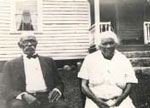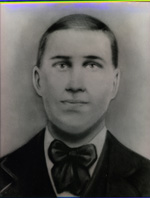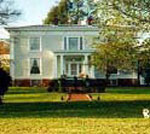
The Children of Thomas Walker of Monroe County
Thomas S. Walker married Christine Anne Waggoner 17 June 1823 in Tazewell County Virginia. In contrast to his father Thomas Walker of Monroe who signed his name with an X, Thomas S. Walker was said to be well educated having been tutored by a Mr. McDaniel of Oxford University. His occupations were as a teacher, surveyor, and farmer and it’s said he had a hand in building Nebo Methodist Church now located in Bland County. I found three children of Thomas S. Walker; Daniel A. Walker, Thomas F. Walker and Mary E. Walker in the records so far. He may have either raised his brother Benjamin’s son (Benjamin A. S.) or had a son named Benjamin.
The legacy of slave ownership of Thomas Walker of Monroe did not carry over to Thomas S. Walker his son or Thomas F. Walker his grandson. Thomas Walker of Monroe left no slaves to Thomas S. Walker nor were any deeds found in Monroe County or Tazewell County of Thomas S. receiving slaves. In 1860 Thomas S. Walker is not listed as a slave owner in Tazewell County census. This is worth mentioning because Thomas S. Walker came from a slave holding family in which all the other members did inherit slaves from their father. Thomas S. Walker may have subscribed to the anti-slavery movement that had been initiated across the country off and on since its beginnings.
William Sanders in his A New River Heritage Volume 4 states that Polly Walker, (Thomas F. Walker’s aunt) who was the last owner of the New River estates of Thomas Walker of Monroe Co. never married. She is reported to have given land to slave families and willed it to nieces who lived far away upon her death. The estate was managed after a fashion by a local relative, Ida Spangler, who couldn’t keep the taxes paid and the homesite and land were eventually sold for back taxes.
No further research has been done on what happened to Elizabeth Walker Pomeroy or the grandchildren Louisa or Benjamin A.S. Walker.
Thomas F. Walker of Bland County
Thomas F. Walker, was born 21 February 1834, the son of Thomas S. Walker and Christine Anne Waggoner Walker. He married Julia Anne Steel. His children were: Isabelle V. born c. 1856; Angelina A. born c. 1860; (Tazewell County Virginia 1860 census) Edna E. born c. 1861; Howard F. born c. 1863; Jasper Newton born 7 September, 1866(History of Bland County); Melissa M born c. 1868; William H. born c. 1870; Ella A. born c. 1875; and James P. born c. 1879. (1880 Bland County Census)
Thomas F. Walker was commissioned as a lieutenant in Company G, 36th Virginia Infantry, CSA Smith’s Brigade on May 3, 1862 in Bland County. He served under the command of Captain Henry C. Groseclose. (History of Bland County pages 273-275.) This company was organized and enlisted on May 3, 1862 for the duration of the war. Thomas F. Walker was at various battles such as Giles County Court House, Winchester, the Battle of Cloyd’s Mountain, Battle of New Market and Cedar Creek. Etc.
(See Steve Teeft web site on the 36th Virginia Infantry at
http://www.hometown.aol.com/SteveCSA/36th_VA.html)
Steve Teeft wrote to me that his full name from the roster was Thomas Fowler Walker. Thomas F. was present until wounded in the right knee at Winchester, Virginia on September 19, 1864. He was captured at Harrisonburg, Virginia on September 25, 1864. Walker was a POW at Point Lookout Maryland then transferred to the prison at Fort Delaware. He was released June 17, 1865 after the war was over. The roster records him as being 6’2, tall, dark eyes and dark hair. He died from fever on 2 Dec 1885.
Thomas F. Walker is not listed on the 1860 slave schedule of Tazewell county as owning slaves, and I have found no record that he owned slaves as did his grandfather Thomas Walker of Monroe County in any of the counties surrounding Tazewell County.
Thomas F. Walker, in 1877, after purchasing the 3000 acres of his grandfather’s land, began to sell it off in parcels. Between 1879 and 1883, Walker had sold and/or contracted with 9 colored families to settle and purchase the land on Dry Fork Creek. It is not known in this stage of the research how Thomas F. Walker came into contact with these families a few of which hailed originally from the tobacco belt county of Franklin. McH Ferguson, Pete Ferguson’s great-grandfather, was one of the earliest recorded. There may have been more contracts, but these nine were eventually issued deeds and recognized in Chancery Court papers.
The nine heads of the families were:
A."Jack" Tynes – 247 3/4 acres, 1879.
Thomas Showalter, 120 acres, 1879
Richard Shields, 247 3/4 acres 1879
Robert Harman, 247 3/4 acres 1879
Jacob Sea, 247 3/4 acres 1879
Wesley Waggoner, 198 acres, 1879
Lewis Holmes, 100 acres 1883 (This property became the land of L. P. Saunders)
James Woods, 115 acres, 1883 (This property identified in Chancery Papers as formerly under contract to Henry Gray.)
Mc H. Ferguson, 201 acres, 1879
The year 1877 for people of color in this country is considered to be a turning back of some of the gains freedmen had acquired after the Civil War ended. Historians consider the year of 1877 the end of the reconstruction era and the beginning of the "New South". President Grant and President Hayes instituted in 1876 and 1877 policies that initiated the return to "home rule" in Southern states. Grant had ordered no more federal troop intervention in local matters, which gave local governments control again over the people of color in their communities. In a society that considered blacks as inferior to whites prior to the Civil War, this helped reinstituted actions on those beliefs through local public policies to foster rules such as the infamous Jim Crow laws. Along with Custer’s last stand in 1876, the governments (state and federal) began new policies for dealing with the native Americans as well as blacks making it a turning point for all people of color in American history.
In the midst of these national policy changes, these nine families began a life on Dry Fork Creek purchasing their land from a former Confederate soldier. The question remains unanswered as to how Thomas F. Walker came into contact with these nine families to sell them property. Where did the families originate from and what were the forces that brought them specifically together on Dry Fork Creek?
What is known about where the families originated from: Ferguson and Woods were former servants of the Booth family in Franklin County VA. Henry Gray and his wife Octavia Saunders Gray were living in the same township as Mc H Ferguson in 1870 in Franklin County. Jacob Sea and Thomas Showalter had children born in Pulaski County and may have been connected with James A.Walker of Pulaski Co. who married Elizabeth Booth of Franklin County. Elizabeth was the sister of Moses Booth of the same Booth family that Ferguson and Woods were servants of after the Civil War. In the 1850 Franklin County Slave Census, James A. Walker is listed owning slaves but is reported to be from Pulaski County. The author to date has found no connection yet of James A. Walker to Thomas F. Walker but the research is continuing.
Richard Shields was born in Maryland and is the only person in this group actually living in Bland County in 1870 census with a Kegley family. Jacob Sea was living in Pulaski County when his son James was born in 1850. Robert Harman was living in Mercer Co. WV in 1868. A. "Jack" Tynes and Robert Harman were listed on the 1870 Mercer Co. WV census living in Princeton and working in the iron works there. The rest of the families are still under research.
Following their settlement on Dry Fork, Thomas F. Walker died in December 1885. His heirs in May of 1886 through their representative T. E. Gregory brought suit in Chancery Court of Bland County against the black landowners of Dry Fork. The suit claimed that the lands under contract to Thomas F. Walker had not been paid for and any contract with Thomas F. Walker was due them.
It is not known what the agreements were with Thomas Walker for the property. The Chancery Records that belong to the case are missing or incomplete in the Library of Virginia repository. What can be assessed from the Chancery Books are that those who could prove the payments made to Thomas F. Walker were not ordered to pay anything or issued credit towards the remainder owed and were issued a deed. Those who could not such as James Woods lost their property when they could not pay for what was due.
Mc Henry (Mack) Ferguson purchased his land again on the courthouse steps for $214.04. Taking out two bonds of $107.01 each payable once a year dating from 1887. Ferguson was finally issued a deed Feb 4, 1891. What is curious about the Ferguson lands is a copy of his father’s will recorded in the Bland County Court house from Franklin Co. Reuben Ferguson, father of "Mack" left his interest in the Bland County property to his three sons, Mack, Eldredge and Dewitt in his 1893 will. Exactly what interest Reuben Ferguson had in his son’s property on Dry Fork has not come to light. Perhaps he help to fund the original land or pay the debt owed in 1897. But the story of the families can begin with Reuben Ferguson and sheds some light of the former slave Mack Ferguson from Franklin Co. VA.
Reuben Ferguson of Franklin County
Reuben Ferguson of Franklin County Virginia does not show up as a free black man in 1850 or 1860 Franklin County Census. He is listed on the 1870 census as being a farm laborer, 45 years of age, mulatto living in Bonbrook TWP, in Franklin County, VA. The family members listed in his household are, Margaret, age 33 keeping house; Roberta age 17, at school; Carter age 16, farm laborer; Mack age 15, farm laborer; Alice age 12, farm laborer; Felix age 10; Archer age 7; Dewitt age 6; Edmond age 4 and Katherine age 7 months. Later in 1889 an entry in the death records states his wife’s name is Catherine, born in 1827 in Charlotte County Virginia. She died Jan 15 1889 in Franklin County of consumption and her husband Reuben reported her death. Reuben in his will lists his heirs as Eldridge, Felix, Mack, Rubin Archer, Mary, Dewitt, Edmond, Henryette Woods, and a grand daughter Annie Winston.
Reuben in a 1874 will is listed as a servant of a wealthy landowner by the name of Moses Greer Booth. Moses, who had no children or wife, left his large estate to nieces and nephews and 3 colored servants. In his will it states, " to each one of the following colored servants to wit, Edmund Clarkson, Reuben Ferguson and Betsy Woods, for their faithful devotion and services to me, the sum of one thousand dollars."
Reuben used part of his funds to purchase jointly with Betsy Lewis a tract of land that divided between them gave them each 180 acres. It was land that belonged to their former (owner?) employer Moses G. Booth. Betsy Woods was called Betsy Lewis in Ferguson’s deed and Reuben was called Reuben Booth in Betsy’s deed.
In the Franklin County 1870 census, Edmund Clarkston (whose official name is James E. Clarkston) Betsy Lewis, and Reuben Ferguson are neighbors. Henry and Octavia Saunders Gray are also living in the same township. Reuben Ferguson’s son Mack (McHenry) married the daughter of Edmund Clarkston (Mary Fannie). By 1879, Betsy Woods’ son James, Mack and Mary Fannie Clarkston Ferguson; and Henry Gray who married Octavia Saunders would moved to Bland County as a group.
It is not exactly proven yet if Reuben was a former slave of Moses Booth. There were close ties to the Booth family. Reuben Ferguson’s sons had the same names as his benefactor’s nephews; i.e. the name Dewitt. Moses’ brother John D. Booth; his middle name was Dewitt. There is also another nephew of Moses Booth named Dewitt Booth and another by the name of McHenry. Reuben felt close enough to the Booth family to purchase his employers former lands in Franklin County and name his children after white family members.
But was he a former slave specifically of Moses Booth or the Booth family? If he was why is his last name Ferguson? To try to answer these questions requires the research of the Booth family and determine who Moses G. Booth was.
The Booth Family
The Booth family of Franklin County was wealthy. They were descendants of merchants and large plantation owners in what is known as Virginia’s tobacco belt. Their family connections spanned over many Virginia counties and several southern states.
Moses G. Booth was a planter and a businessman with multiple enterprises. He enjoyed the prosperity of a Southern country gentleman in the antebellum days prior to the Civil War and after the Civil War appears to have still faired well at retaining his fortune. It is said that he had six nephews who served in the Confederacy and at the end of the Civil War, Moses gave all six $200 in gold and a good horse as gratitude and a new start in life.
Moses Greer Booth was born in 1803 and was named after an officer in the Revolutionary War. He was known as a civic leader of early Franklin County. He also served as a justice on the county court. By 1860 he had 700 acres under cultivation and owned up to thirty slaves. He built the house known as the Booth-Lovelace house in 1858 which is a Greek Revival structure with Italian details – one of the finest houses of its day. It is located in Red Valley, across from Windy Gap Mountain from present day Roanoke and is operated as a bed and breakfast, called Over Home by Jim and Becky Ellis. It is said he built the house for his bride to be. Some accounts say the marriage never took place, while others say there was a marriage but his wife died shortly thereafter. Moses never remarried or had children.
Moses got his money partly the old fashioned way, he inherited a good portion of it. He and his brother John Dewitt Booth were partners in most of their enterprises. Through their father Benjamin, Moses and his brother obtained land and a store to run as merchants. They both at one time were listed as postmasters of a place called Taylor’s store. They owned and ran an ordinary or tavern, and a tobacco factory. Moses Booth was also a distiller of brandy and wine. In the inventory of his property in 1875 it listed he owned 4 stills and among the inventory were 526 gallons of brandy, 35 gals of wine and another 42 gals of something not exactly listed as wine . According to Becky Ellis the current co owner of the Booth-Lovelace house, she has a copy of a story in a newspaper where Moses had won a blue ribbon at the county fair for his brandy.
By 1860, Franklin County had seventeen tobacco factories. That number declined after the Civil War. John D. Booth in the 1850 census was listed as a tobacco manufacturer. Moses as a merchant. The family was connected to the Ferguson, Saunders, Walkers and Burroughs families through the marriages of the sisters of John Dewitt and Moses G. Booth. Catherine Booth married Thomas Burroughs, the brother of James Burroughs who at one time owned a slave listed as Bowker T. (Booker T. Washington) Sarah Booth married Josiah Ferguson and it may be this connection to where Reubin took his last name. Elizabeth married James A. Walker whom in tax lists is listed from Pulaski County. Emily married James W. Joplin. Their sister Mahala married a Webb. A niece Anne had married John Saunders and it was her son John Saunders who was the executor of Moses G. Booths estate. The families of Booth, Ferguson, Saunders and Burroughs were in the same area of the county. Their plantations adjoined each other and they intermarried within their class and group.
Would you like to return to the top of the page?
copyright©bland county history archives all rights reserved 2000


